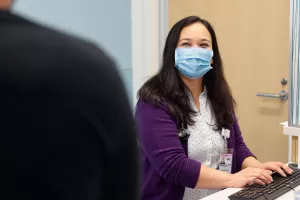Memory disorders slow down our ability to think, learn and remember. Although there is no cure for memory disorders like Alzheimer's disease, there are therapies that can manage symptoms and improve daily functioning.
What is a memory disorder?
Memory disorders are caused by damage to areas of the brain that control thinking, learning, memory and problem-solving.
These disorders, grouped under the umbrella term "dementia," can develop suddenly or get worse over time. Alzheimer's disease is the most common type of dementia among older adults.
Memory disorders can range from mild to severe, with symptoms worsening. Unlike age-related memory loss, dementia symptoms interfere with daily activities like driving, working and socializing.
If you are experiencing memory loss or a decline in functioning, you should talk to your doctor. You can count on us to provide answers and create a treatment plan for the future.

Conditions
Many memory disorders like Alzheimer's are often progressive and degenerative brain diseases. There is hope with early diagnosis of some memory disorders and clinical trials.
Early symptoms may include:
- Changes in personality
- Difficulty performing familiar tasks
- Diminished judgment
- Language difficulties
- Memory loss
- Mood swings
There are many conditions that can lead to memory loss, including:
Testing
We specialize in providing early diagnoses and treatment to give you the best chance at maintaining your brain health and slowing disease progression.
Our patients receive a comprehensive geriatric assessment that looks at physical, functional, financial and social issues.
We make sure that any cognitive declines are not caused by something reversible like B12 deficiency, hypothyroidism, and pressure on the brain.
Treatments
We want to help you live your fullest life before and after a memory disorder diagnosis. We will come up with an action plan to help you get the best treatment possible. We may recommend medications like cholinesterase inhibitors and memantine, which can reduce and even control some symptoms.

From regular office visits to inpatient stays, find the healthcare you need and deserve close to home.

Meet the doctors and care team devoted to supporting you every step of the way along your path to better health.